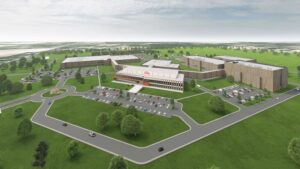Eli Lilly to invest $4.5 billion in integrated drug discovery and manufacturing facility
Eli Lilly and Company has announced plans for a $4.5 billion (£3.6 billion) facility that integrates pharmaceutical research and manufacturing. The Lilly Medicine Foundry, revealed on 2 October 2024, will aim to streamline drug discovery and production processes. This approach could significantly accelerate the journey from drug development through clinical trials to manufacturing.
The Lilly Medicine Foundry, to be located in Indiana’s LEAP Research and Innovation District in Lebanon, Indiana, represents a novel approach in pharmaceutical infrastructure. It is designed to house both research activities and manufacturing processes.
David A. Ricks, Lilly’s chair and CEO, commented: “This new complex will further strengthen our process development and scale up our manufacturing capabilities to speed delivery of next-generation medicines to patients around the world.”
Technical capabilities
The facility’s design incorporates flexibility to accommodate various molecular therapies, including small molecules, biologics, and nucleic acid therapies. This versatility is intended to position Lilly to adapt to emerging therapeutic modalities and evolving patient needs.
A key objective of the Medicine Foundry is to develop and optimise manufacturing processes that can be scaled up and transferred to Lilly’s other production sites. This approach aims to enhance overall manufacturing efficiency and capacity, leading to more rapid and cost-effective drug production.
Research implications
For the scientific community, the Lilly Medicine Foundry represents a significant development in clinical trial supply and conduct. By integrating research and manufacturing capabilities, Lilly aims to reduce the time and cost associated with producing medicines for clinical trials.
This integrated approach will allow for greater flexibility in clinical trial design, as researchers will be able to make rapid adjustments to formulations or dosages based on early trial results. Such agility could prove particularly valuable in the development of treatments for complex or rare diseases, where traditional drug development pathways often face significant challenges.
Environmental considerations
The facility is designed to incorporate sustainability goals through optimised manufacturing processes, aligning with industry efforts to minimise the ecological impact of pharmaceutical production.
Economic impact
Once fully operational, the facility is projected to create 400 new full-time positions for skilled workers, including engineers, scientists, operations personnel, and lab technicians.
The Medicine Foundry is part of a larger investment strategy by Lilly in the Lebanon area. Since May 2022, the company has committed over $13 billion to expand its manufacturing and research capabilities in the region.
U.S. Secretary of Commerce Gina Raimondo contextualised the investment: “This kind of investment will help the United States maintain leadership in advanced manufacturing and accelerate innovation. It will complement the $51 million Tech Hubs investment the Biden-Harris administration announced in July to advance Central Indiana’s global leadership in biotechnology and biomanufacturing and strengthen the nation’s biotechnology supply chain.”
Future outlook
The Lilly Medicine Foundry is expected to be operational by 2027, with construction set to begin in early 2025.
This development reflects a broader trend in the pharmaceutical industry towards more agile and integrated approaches to drug development and production. The success of this model could have significant implications for the future of pharmaceutical research and manufacturing methodologies.





